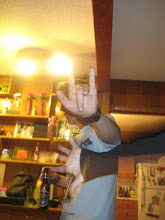Anyone you know who admits to watching The Hills (or it’s much more engaging spin-off, The City) probably laugh off their infatuation by noting that they’re very in-tune with the pure insanity of this baseless programming, and this is what makes it okay. We all do it. We all love it too – many are so above calling ourselves a Hills fan, yet line up to soak it all up. We love to hear ourselves talk about grand insights and stimulating, imaginative thoughts on why The Hills represents our culture in some profound way, or conversely why watching The Hills is a completely absurd waste of time because it’s an insult to actual, Real people and the way they live their lives. People enjoy discussing sweeping thoughts on ‘Why The Hills pre-fabricated narrative doesn’t take away from the ‘reality’ of the characters because we are all smarter than the characters of the Hills’ anyways’ (Who hasn’t had the ‘it’s all pre-scripted’ conversation once or twice?). By indicating that we are simply mocking the norms and absurd nature of fashionable pointlessness, we are its fatalities. Pop culture has its place and its place is all-consuming. Finding a sufficient voice that can dissect the seemingly unimportant and vain in the trashy hallways of cultural oblivion has a very welcome space.
Nobody entices pop-culture junkies and anti-culture elites among us like Chuck Klosterman. By making connections on pop phenomena that seem to mean nothing, mean something, his forays into cultural experiences are both amusing and provoking. His riffs on things ranging from Billy Joel to Saved by the Bell are well-received opinions about the non-literal aspects of pop culture fabrications, and his timely dialogue about their significance in popular culture is wildly entertaining and more-than persuasive. Indeed, it is in Klosterman’s introspection about seemingly ordinary and superficial habits of modern existence that he has created a mini-legacy. Sure, there have been others like him before, the Hunter S. Thompson’s and Lester Bangs’ who flipped cultural beasts and made substantial impacts on their own culture by precisely calling out culture, but nobody represents Generation-whatever-we-are-now like Klosterman.
Although already being compared to his breakthrough, 2004’s Sex, Drugs, and Cocoa Puffs, Klosterman takes on a highly-introspective analysis of himself in Eating the Dinosaur. Rather than merely digesting and discussing his love/hate relationship with bubblegum pop of all forms, Klosterman digs deep into his own psyche as part of a bigger pop-culture creature. Because now, not only being a critic of entertainment and a passionate and wonky authority on the complexity of it, he has actually become the celebrity and the critiqued; he has people interviewing him and wanting to delve into his thoughts about the pop culture he is now a part of. Modern culture is not just a result of our society’s fascination with pop. Klosterman argues that modern culture is obsessed with these forms of popular culture and how creative we are in coming up with anecdotes about something like The Hills is its result. "We are latently enslaved by our own ingenuity, and we have unknowingly constructed a simulated world,” Klosterman notes. "As a species, we have never been less human than we are right now.” This has Chuck Klosterman truly concerned.
Klosterman seems to be mainly searching for a type of human authenticity in Dinosaur. And it is when he starts to write about his own personality and the actual process of writing that this oddly existential side of himself emerges. At the forefront of each essay it seems there is a sense of Klosterman’s inner-doubt shining through and even though he is writing about everything from the connection between David Koresh, the Branch Davidian’s and Kurt Cobain’s desire to make In Utero a poor album, to Garth Brooks transformation into the ambiguous pop brand of Chris Gaines, he longs for an answer to human authenticity – yet he notes that authenticity is necessarily elusive and probably won’t be discovered. He can’t even discover why (or when) he is being authentic to himself or about himself, never mind trying to discover this quality in other things.
Klosterman comes across as some kind of maniacal thought-machine. It’s like he is a suffering from chronic insomnia, and rather than stare at the ceiling, he’d rather gaze at a computer screen and attempt to logically ponder why the Unabomber’s manifesto is an under-appreciated masterpiece, why the NFL is Marxist organization, or how laugh tracks in Friends episodes often cover uninspired, drab writing. His thought experiments are as developed in Eating the Dinosaur as they are in his previous works, and although he finds himself at a completely different juncture in his most recent book, the results are perhaps more raw and less self-conscious than his others writing. If you were to take my advice (you’ve read this far, after all), I would suggest reading his work in the order it was produced. Klosterman isn’t as much of an icon as I’ve made him out to be, I suppose – and he likely would even suggest that I’ve put way, way too much thought into this already. But ask your token hipster friend if they’ve read Klosterman and chances are they have. Chances are they consume it like Ritalin, and chances are they (secretly) like The Hills.
Poposaurus
11.15.2009 by Curtis Wright
Subscribe to:
Post Comments (Atom)

0 comments:
Post a Comment